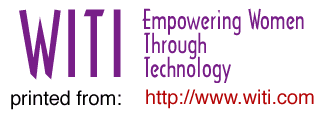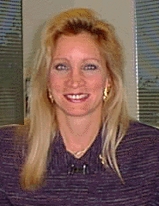
 WITI
Women
WITI
Women
Vice President - Director,
Merrill Lynch GEST Project Office & Women's Network
Marianne Sarcone, vice president of Merrill Lynch's GEST Project Office, is the former manager of the release management support area of AOS&T's Project Office. Her responsibilities included, but were not limited to process management, project planning and control, prism application quality assurance testing, TGA blueprint management and development of an AOS&T Web page.
Sarcone began her career with Merrill Lynch in the sales branch office in 1975 as a paralegal/new accounts controller for 5 years. She spent 3 years training personnel and new account managers Name & Address processes and technology in all 14 Regional Service Centers throughout the U.S., and eventually filled the role of new accounts manager in the NY Service Center. In 1986, Marianne combined her business knowledge with systems technology and became a developer, accountable for the firm's N&A Critical Core Path system. This eventually led to acquiring full management of the firm's client information systems for 3 years.
Sarcone now directs a project office for Merrill Lynch GES Technology Organization and process management and systems communications for the ISSS Organization. She also directs the Women's Network for The Merrill Lynch Private Client Technology Division.
1. What was your first job in technology?
In my first job in technology, I was thrown into the fire - at my request!
After spending thirteen years on the business and operations side of Merrill
Lynch, I decided it was time to round out my career. I
left a wonderful management position to become a junior programmer
analyst. I bought and read every book you could find way back when
to teach myself Cobol and
JCL - after all I had a plan! Since I had a strong background in Name and
Address processing from the front-end of our business to operations, I
wanted to take that knowledge to the next level. I was very specific about
what I wanted to learn in the technology organization. Luckily,
I was able to do just that! I was placed on the Merrill Lynch Core
Critical Path Batch Systems. That meant enhancing very old
spaghetti-code programs with multiple linked called programs.
My first assignment was to make three major changes to the main program for the N&A system. Everyone was so nervous that SWAT was going to call that night with an Abend. I wasn't! Not only did I have a plan for my career, but I had work plans/schedules with real tasks and time frames built in especially for testing. I felt it was extremely important to start work and do all of the necessary planning, prototyping, documenting, coding, testing, etc.
To everyone's surprise, I never had a job Abend in production in
three solid years of hands-on experience. After that time I started
pursuing the management track again but on the systems side. In a
very short period of time I became a senior systems manager for the
firm's entire N&A and Document and Linkages systems area. It was a great job! For three and a
half years, our team continued to deliver on all projects by working smart and being proactive.
We lived process to the "T"!
2. Who has been your most significant mentor? Why?
I have had two formal mentors who have been extremely instrumental in my
career by offering the lessons that they learned the hard way and sometimes
allowing me to make my own mistakes to learn from as well. Sometimes it was
a true set-up and I walked right into it. Believe me, it's probably
best to learn that way.
However, my most significant mentors are my friends who are on the
outside looking in. It's these people who are the most effective in
giving you something that someone in your own environment usually misses. It's
the practical, common sense advice that is so worthwhile.
3. What has been your greatest challenge and what strategies did you use to overcome
obstacles?
During my twenty-four year tenure with Merrill Lynch, one of the challenges I faced
very early in my career was the need to learn as much about the firm as possible.
Not just my area of responsibility, but
- what the firm is as a whole
- the corporate culture
- who's who
- what are the policies and procedures
- how many sectors and units exist within it
- what goes on around you
- who and what are your inter-dependencies
These are a few other challenges that came up over the years ...
- Not knowing the right people or having the right people know who you are. In
this case, networking became very important.
- Setting goals and driving your own career destiny. To accomplish this I needed
to ensure that management understood my career goals. This enabled them to coach
and guide me in working towards them.
- False perception. This is an challenge I hear about every day through the Women's
Network. Being labeled as aggressive, emotional and sensitive as opposed to assertive,
effective and passionate! In this case I insisted on developing a personal profile in which
my manager, peers and subordinates answered a series of questions resulting in an
analysis of how people perceived me.
- Empowerment. Being given a position but not being empowered to make decisions based on your subject-area of expertise is a significant obstacle. In this case I recommend you gain the trust and respect of management to enable them to become more comfortable with you making decisions on their behalf.
4. Who has been the most influential person in your life? Why?
My parents have been the most influential people in my life. They provided me with the understanding that there isn't anything I can't do unless I choose not to. They helped me develop a solid foundation in my life so that I could complete that foundation with my input and style. They gave me the freedom to make my own decisions and to learn from my many mistakes. These lessons taught me that it's okay for people to make mistakes as long as they don't make the same mistake twice and they learn from the experience - an important lesson which I apply to my management style.
Another influential person in my life has been my husband of 18 years who continues to be my very best friend and confidant. Having his support is all I need to keep going!
Lastly, the CTO of our technology division has been very influential
in my life. He continues to empower and support me in directing the
Women's Network for his division. This is a great honor and
demonstrates respect! This is a man whose leadership talent and
stand-up communication skills I truly admire.
5. What lessons have you learned that would be valuable to women beginning their
careers in technology?
First, don't proclaim to know everything - that's why we hire subject-area
experts. Learn from everyone - learn what to do and what not to do!
Also, work smart and be proactive, not reactive. Follow process and have
good project management expertise in place. Keep a central repository of
all documented processes, procedures, documentation, etc. Enable your
employees and yourself to do "one-stop-shopping" when looking for
information that pertains to their job, etc.
6. What strategies do you use to maintain balance in your life?
Know your priorities and plan accordingly. Always know what's ahead
of you. "Get in front of the eight ball," I always say! When you
can project what's ahead of you, you can plan to allocate the
appropriate time and schedule that would be more conducive to you as an
individual.
Remember that you are human and you can only do so much at one time. Multitasking is great as long as you can complete each task with quality results.
Stop and think about the things that are important to your family not just
your job. Make room in your life for fun!!!
7. What new technology do you believe will have the most positive impact on the
world in the next 20 years? The most negative impact?
TV Net. I go back to that "one-stop-shopping" metaphor. In the
convenience of your own living room in the flip of one or two buttons, you
can watch TV, surf the net, go shopping online, trade online, etc.
However, this technology may also have a negative impact, as future
generations will perhaps miss out on trips to the library or store and miss out on socializing and networking
opportunities. Perhaps they won't go the extra mile that we do today.
On a lighter note:
1. If you could have dinner with any 2 people (living or not), who would they be?
I feel like I'm in a beauty contest with this question ... but here it goes:
The CEO of my firm and my mother who I miss terribly.
2. Define success in 10 words or less.
Doing what you enjoy to the fullest and being happy!
3. If you could only subscribe to 3 magazines, what would they be?
Working Mother, Mutual Funds and InfoWorld.
4. What was the last book you read?
The Promotable Woman - Advancing Through Leadership Skills, by Norma
Carr-Ruffino
For more 'WITI Women' articles, go to: http://www.witi.com/wire/witiwomen/
For all the latest news and information on women in technology, visit http://www.witi.com